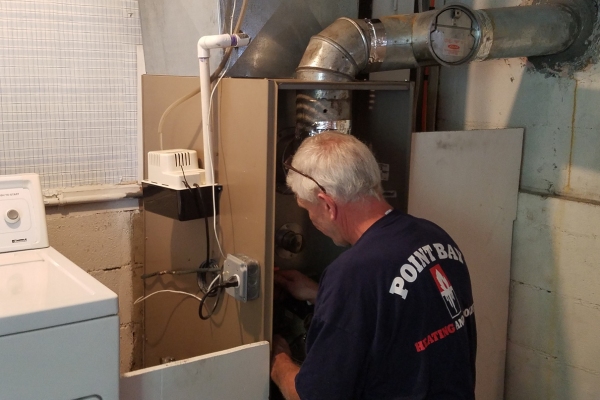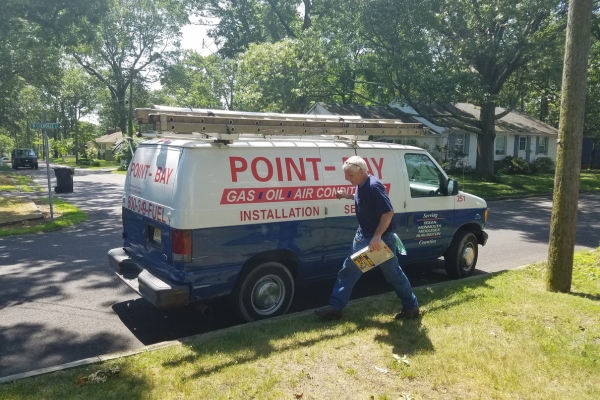
Furnaces are crucial for maintaining warmth and comfort in our homes, particularly when the temperatures drop. As a homeowner, it is crucial to grasp the significance of a dependable heating system and its lifespan, efficiency, and safety features. This article explores these essential facets, equipping you with the information necessary to keep your furnace functioning optimally for its expected furnace lifespan or more. Stay knowledgeable and cozy with Point Bay Fuel, your expert in understanding and maintaining your home’s heating system.
Grasping Furnace Lifespan

The longevity of a furnace can differ substantially based on its type. Gas furnaces, frequently preferred by homeowners, generally endure between 15 to 20 years. Conversely, electric furnaces might last a bit longer, usually spanning 20 to 30 years. These figures are broad averages, and the true lifespan of a furnace can fluctuate depending on various factors.
Don’t wait for a breakdown—book your HVAC inspection with Point Bay Fuel and stay cozy all season. Call now!
Factors Influencing Furnace Lifespan
A few factors can significantly affect how long your furnace will last.
- HVAC Maintenance: Keeping your furnace in top condition maximizes its lifespan. This involves annual check-ups, thorough cleaning of parts, and timely repairs. Ignoring regular maintenance can cause early deterioration.
- Heating Usage Patterns: The frequency of furnace use directly impacts its longevity. Homes in colder regions or those relying heavily on their heating system might see a shorter system lifespan due to increased wear and tear.
- Furnace Installation Quality: Ensuring your furnace is installed by a certified professional is critical for its durability. Improper installation can cause inefficiencies and additional stress on the system, shortening its lifespan.
- Brand/Model Furnace Specifics: Investing in higher quality brands and models generally results in longer-lasting furnaces. Although these options might come at a higher cost, they offer superior construction and components that enhance longevity.
Remember, being aware of these factors can help you extend the life of your furnace. For expert guidance and premium maintenance services, look to Point Bay Fuel to keep your furnace running efficiently for years.
Signs of an Aging Furnace

Identifying the signs of an aging furnace is crucial for maintaining your home’s comfort and safety.
- Furnace Efficiency Decline & Rising Costs: As furnaces age, they become less efficient, requiring more energy to produce the same amount of heat. This inefficiency increases heating bills and makes maintaining stable temperatures throughout your home difficult.
- Frequent Furnace Repairs: A surge in the frequency and cost of repairs can clearly indicate that your furnace is nearing the end of its useful life. Regularly needing repairs can become costly and is often a strong indicator that it might be time to consider replacing your system.
- Inconsistent Heating & Comfort Issues: Older furnaces may struggle to distribute heat evenly, leading to temperature fluctuations and comfort problems in various parts of your home.
- Odd Heating System Noises: Banging, whistling, or rattling noises are typical indicators of aging in furnaces. These sounds often arise from loose or worn parts, highlighting the system’s increased effort to maintain heating efficiency.
If you notice any of these signs, seek professional assistance. Contact Point Bay Fuel for a comprehensive check and expert guidance on whether repair or replacement is the most suitable option.
Experience hassle-free HVAC service with Point Bay Fuel. Call now to schedule your appointment!
Safety Concerns with Old Furnaces
A critical hazard linked with old and malfunctioning furnaces is the potential for carbon monoxide (CO) leaks. CO is a deadly, colorless, and odorless gas that becomes extremely dangerous at high concentrations. Older furnaces, especially those lacking regular maintenance, are more prone to cracks in the heat exchanger. These cracks can result in CO leaks, posing severe health risks to your household.
Aged and poorly maintained furnaces present a heightened fire hazard. As they age, components deteriorate, electrical connections may become unstable, and flammable debris can gather within the system. Such conditions might cause overheating or even ignite nearby materials.
General Furnace Safety Tips

Maintaining furnace safety is vital for protecting your home and family. Here are some essential tips to consider:
- Regular Furnace Inspections: It’s crucial to schedule annual inspections for your furnace with a qualified technician to confirm that it’s operating safely and efficiently.
- Install CO Detectors: To enhance safety, install carbon monoxide detectors close to bedrooms and on every floor of your residence to detect any presence of this dangerous gas.
- Be Alert to Warning Signs: Stay vigilant for any unusual odors, noises, or if the furnace flame appears yellow instead of its normal blue color. These signs could indicate potential issues with your furnace.
- Keep the Area Clear: Maintain a clutter-free zone around your furnace, ensuring that flammable materials are kept at a safe distance to prevent fire risk.
- Educate Your Family: It’s essential to educate all family members about the signs of carbon monoxide poisoning and the appropriate actions to take during a furnace emergency.
Maintaining Your Furnace for Longevity & Safety

The cornerstone of your furnace’s longevity and safety lies in consistent maintenance. Annual checks by a certified HVAC technician are essential. These inspections boost your furnace’s efficiency and safety while detecting potential problems early, preventing expensive repairs down the line.
Homeowners can also undertake simple maintenance tasks safely, such as replacing filters, checking thermostats, ensuring vents and registers are clear, and conducting visual inspections to keep their heating system in prime condition.
While DIY maintenance is crucial, professional HVAC services are paramount. Experts are equipped to handle complex procedures, including inspecting gas connections, checking for cracks in the heat exchanger, testing safety controls, and optimizing overall system efficiency.
Ready for reliable heating? Contact Point Bay Fuel for top-tier furnace maintenance services, guaranteeing that your heating system stays dependable, secure, and efficient for years.
Furnace Repair vs. Replacement
Determining whether to get a furnace repair vs. replacement is a crucial choice that impacts comfort and cost.
- Cost-Benefit Analysis: Consider the expenses associated with ongoing repairs and the inefficiencies of an old furnace compared to the advantages of a new model, which include improved efficiency and reduced operational costs.
- Furnace Efficiency & Technology Upgrades: Modern furnaces provide superior efficiency and incorporate the latest technology, resulting in more effective fuel utilization, decreased energy expenses, and advanced safety features. These enhancements allow for more accurate temperature management and a smaller environmental footprint.
- Environmental & Safety Considerations: Contemporary furnaces are designed to be more environmentally friendly, generating fewer pollutants and wastes. Newer models have improved safety features, reducing hazards such as carbon monoxide leaks and potential fires.
When to Replace Your Furnace

Be mindful of these indicators that suggest it’s time to replace your furnace:
- Furnace Age & Safety: If your furnace is beyond 15-20 years of age, particularly if it frequently malfunctions, emits unusual noises, or fails to heat consistently, consider replacing it. An older furnace loses efficiency and heightens safety risks, such as potential carbon monoxide leaks.
- Rising Heating Costs: A noticeable surge in heating expenses usually indicates that your furnace is becoming less efficient. Switching to a more modern and energy-efficient model can be more economical over time.
- HVAC Technological Advancements: Contemporary furnaces have enhanced efficiency, safety features, and intelligent controls, providing superior performance and a safer, more environmentally friendly heating option. These improvements are particularly valuable if your existing furnace is becoming obsolete.
For a comprehensive evaluation and professional guidance, turn to Point Bay Fuel to assist you in making well-informed decisions for your home heating requirements.
Choosing a New Furnace
When it’s time to select a new furnace, several crucial considerations should guide your decision. First, focus on efficiency by choosing a model with a high Annual Fuel Utilization Efficiency (AFUE) rating, which can significantly reduce operating costs. Second, make sure the furnace is correctly sized for your home to optimize efficiency and comfort. Third, decide on the type of furnace—gas, electric, or oil—based on what’s available and your preferences.
Additionally, safety features should always be prioritized to guarantee secure operation. High-efficiency furnaces often carry higher initial costs but provide substantial long-term savings and enhanced safety. For the best results in safety and efficiency, professional installation is essential. Expert technicians will ensure proper sizing and installation, which are key to maximizing your new furnace’s performance and extending its lifespan.
Conclusion
Comprehending your furnace’s lifespan, efficiency, and safety issues is essential for keeping your home comfortable and secure. Regular maintenance, recognizing the signs of an aging furnace, and determining the appropriate time for a replacement are critical to optimal furnace operation. Whether you’re upkeeping your current system or selecting a new one, always prioritize safety and efficiency to ensure your heating system serves you well into the future.
Contact Point Bay Fuel for All Your HVAC Needs
Point Bay Fuel delivers top-notch heating and cooling solutions across Ocean County and Monmouth County, New Jersey. Our highly skilled, professionally certified technicians are adept at performing HVAC tune-ups, repairs, installations, replacements, and more! Each technician is equipped with the expertise to handle your HVAC needs expertly.
We offer the region’s most competitive prices for heating and cooling services. Our maintenance services are designed to improve home comfort, boost your system’s energy efficiency, and minimize heating and cooling expenses. Should you require an HVAC repair or a new system, we will guide you to the ideal solution that fits your budget. We stand behind our work with a satisfaction guarantee to ensure your peace of mind. Contact Point Bay Fuel today to arrange a service visit and receive a free in-home estimate. Call now!
Contact us now by calling (732) 349-5059 to speak to one of our home comfort specialists! Click the link to view our service area.

Related Articles:
- Can Furnaces Work Without Filters?
- My Furnace Won’t Turn Off – Why?
- Why Is Furnace Sizing So Important?
- Furnace Will Not Turn On With Thermostat
- What To Do When Your Furnace Blower Keeps Running But No Heat
The post The Lifespan of a Furnace: Key Factors and Insights appeared first on Point Bay Fuel.
No comments:
Post a Comment